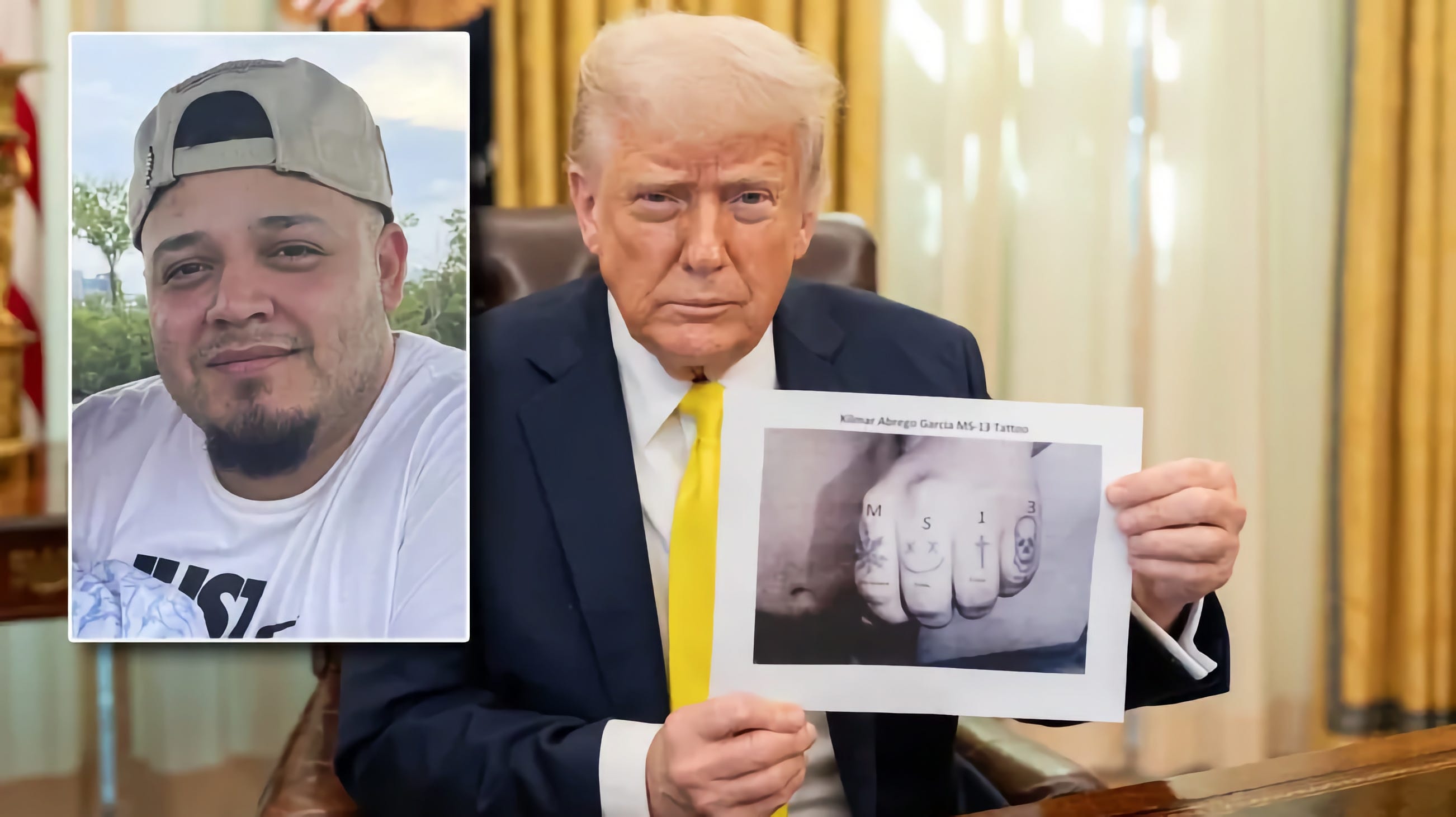It started with a video. Trump and Terry Moran, circling each other—one insisting that a deported man had “MS-13” tattooed on his knuckles, the other gently, then not-so-gently, pointing out the image was fake. Trump wouldn’t let it go. Wouldn’t move on to Ukraine. Wouldn’t entertain the possibility that a Photoshopped hand had helped justify a deportation.
I watched it more than once—not because I didn’t understand, but because I couldn’t quite believe I did. Either he was knowingly gaslighting millions on camera, or he actually believed it. And I’m still not sure which is worse.
Somewhere in that spiraling exchange, something cracked open. Not just about truth or power, but about memory, performance—about what happens when the person repeating the lie thinks it’s a test, and thinks he’s winning.
Person. Woman. Man. Camera. Tattoo.
They give you five words.
He had his: Person. Woman. Man. Camera. TV.
I’ve got mine. A variation, let’s say—still simple, still unforgettable.
Person. Woman. Man. Camera. Tattoo.
You say them once, then again, then twenty minutes later they ask you to say them again, and you do—perfect order.
They say, “That’s incredible.”
They say, “Only someone with tremendous cognitive ability could do that.”
And I say, “Exactly.”
Because it’s not just memory.
It’s pattern recognition.
It’s seeing what others miss.
They show you a hand—just a hand, no context—and you see what they don’t.
M. S. One. Three.
Not everyone can see it.
You need a sharp mind. A beautiful mind, some say.
They see a leaf, a skull, a smiley face.
I see four tiny billboards.
Deport me.
Some people—fake news people—say the image was photoshopped.
But I say: absence is the loudest proof.
That’s how you know they erased it.
They got to him.
Maybe with lasers.
Maybe with makeup.
Maybe his hand forgot.
Maybe that’s what erasure looks like now.
But I didn’t forget.
I passed.
I remembered the words.
Person. Woman. Man. Camera. Tattoo.
That’s how you know I’m fit to decide who disappears.
But somewhere between the laughter, something started to feel wrong.
I don’t know when the satire stopped being funny.
Maybe it was the drone footage of the Salvadoran mega-prison—bodies arranged in tight rows, heads bowed, wrists zip-tied like punctuation marks no one meant to use.
Or the hand, the real one, in the photo with Senator Van Hollen.
Smooth knuckles. No ink. Just skin. Just proof—ignored.
Or maybe it was something smaller.
The way he kept repeating the words.
Person. Woman. Man. Camera. Tattoo.
Like if he said them enough, they would become true.
Like the rhythm itself was a kind of spell—conjuring a cleaner narrative, drowning the silence beneath it.
A man was deported because of a JPEG.
A man was held in a prison designed for spectacle, not justice.
And somehow, the story became about the picture—not the person.
Sometimes I think we are all being tested.
Not for memory, but for mercy.
I wonder if the real exam is this:
Can you remember what isn’t convenient to remember?
Can you hold the truth when it doesn’t fit the narrative?
Can you stay present when power would rather you look away?
They said he had gang ties. But no one proved it.
They said he had tattoos. But none showed up.
They said he was dangerous. But he had a court order protecting him.
And still, they sent him away.
We think of propaganda as something grand, authoritarian.
But sometimes it’s just a photo, a boast, a tweet.
A voice that won’t stop talking.
A lie repeated until it sounds like memory.
Like a test.
And still: I remember.
Not the version with the tattoos.
The one with his daughter.
The one where he’s not a threat but a father, folding her jacket sleeve, mid-laugh.
Maybe her coat was red.
Maybe she smelled like oranges.
Maybe she handed him a crumpled drawing with too many stars.
I remember because forgetting feels too easy now.
Too practiced.
The one they didn’t post.
In the end, I suppose he passed his test.
He remembered the words.
He pointed to the picture.
He said it loud enough that no one needed to check twice.
And what do we do, those of us who did check—
who saw the clean hands and the legal order and the child waiting by the door?
What do we do with our remembering, when the system runs on forgetting?
Sometimes I whisper the words to myself, just to see if they still mean what they used to.
Person.
Woman.
Man.
Camera.
Tattoo.
Sometimes they’re just nouns.
Sometimes they’re a prayer.
Sometimes they’re a list of things we’ve already lost.
Sometimes they’re all that’s left—
faint as ink on washed hands.



Very very scary. Thanks for shining a spotlight on what truly matters right now, Robert.
Thanks, Sharon.
Watching the video was scary. He is not a well man. What makes me more scared is that he's just a puppet, a sideshow attraction that conveniently keeps us from noticing the people dipping their hands in our pockets.
I'm truly worried about the people working his strings, as they are knowingly and intentionally destroying our democracy, and hurting a lot of people in the process.